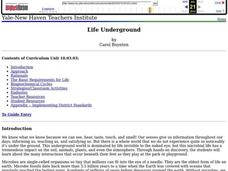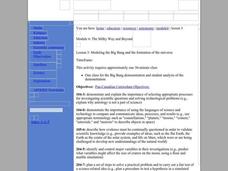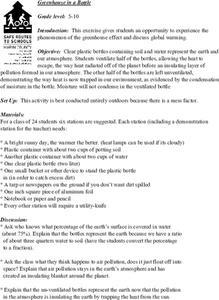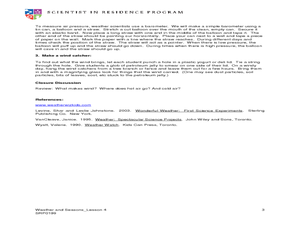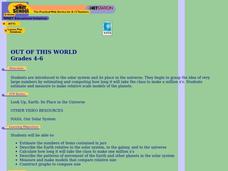Curated OER
Stream Ecology In Wisconsin and Puerto Rico
Students identify the different types of water and explain in what proportions they exist on Earth. They identify and correctly label the parts of the water cycle and how these parts interact with each other. Students identify the...
Curated OER
Time Line of Astronomy Events and Discoveries
Students work in groups to present a segment of a timeline of events and discoveries in astronomy. In this astronomy lesson plan, students teach their classmates about their section of the timeline.
Curated OER
Life Underground
First graders build a terrarium in order to observe animal and plant life dynamics. In this biology lesson, 1st graders compare how organisms survive in different environments. They write their observations and analysis in their journal.
Curated OER
The Big Bang Theory
Students will use scientific reasoning to formulate ideas about the formation of the universe using the Big Bang Theory. The use of critical thinking skills is part of the activity and the foundation of the scientific method will serve...
Curated OER
Modeling the Big Bang and the Formation of the Universe
Sixth graders conduct an experiment to understand the Big Bang Theory. In this Big Bang Theory lesson plan, 6th graders will observe a balloon with confetti popping to emulate and analyze information related tot he Big Bang theory....
Curated OER
Lunar Lollipops
Students simulate the phases of the moon using a lamp and styrofoam balls. In this lunar phases lesson, students stand around a lamp and act as Earth. They hold styrofoam balls and rotate to show the phases of the moon.
Curated OER
Greenhouse in a Bottle
Students create models of the greenhouse effect using recycled 2-liter bottles. They discuss how their models compares to the real greenhouse effect the earth experiences.
Curated OER
Clip the Face
Students discover the moon's phases and the rarity of eclipses. In this lunar lesson, students view a video titled Spin Around the Solar System: A Moon Dance, which demonstrates the key differences between a lunar and solar eclipse....
Curated OER
Eco Points Score Card
Students play a game in which points are assigned to daily activities which require fossil fuels or electricity. They compare the impact their energy and transportation choices have in everyday life.
Curated OER
Moon: NC Summer Tour Lesson 2007
Students investigate craters and marea. In this crater and marea lesson, students conduct an experiment to create craters. Students participate in a dance activity.
Curated OER
Dinosaurs Here Yesterday Gone Today
Learners take a pre-test to show their prior knowledge of dinosaurs. Using the internet, they reasearch the time period in which they roamed the Earth. Focusing on the area of Connecticut, they compare and contrast the large and small...
Curated OER
Wind and Air Pressure
Students make an anemometer, barometer, and wind catcher to see how wind and air pressure are related. In this wind lesson plan, students use these tools to measure the wind speed.
Curated OER
Volcanoes: Kindergarten Lesson Plans and Activities
In the pre-lab, kindergarteners mimic the movements of the eruption of a volcano and discover various volcanoes around the United States. Then, pupils sort different types of volcanic rocks in the lab before learning how volcanoes grow...
Curated OER
Jupiter's Weather Forecast
Students read information about Jupiter and the planet's weather. In this Jupiter weather lesson plan, students read information about Jupiter's weather. Students study a chart about the weather on Earth and Jupiter. Students read a...
Curated OER
Scale Model of the Solar System
Students explore the size of the planets. In this science lesson plan, students create a scale model of the solar system. Students determine a scaling factor and calculate the size of their planets. Students create a scale drawing of the...
Curated OER
Measuring Sizes
Students explore the concept of scale. In this measurement lesson, students measure common classroom objects in order to help them better understand scale.
Curated OER
Our Solar System
Third graders describe the composition of our solar system. They recognize the names of the planets in our solar system and compare and contrast the nine planets that orbit the sun.
Curated OER
How High Does the Atmosphere Go?
Students explain how relatively thin the atmosphere is, compared to the size of the planet, and determine the relative extent of the four major atmospheric layers.
Curated OER
Out of This World
Students are introduced to the solar system and its place in the universe. They begin to grasp the idea of very large numbers by estimating and computing how long it take the class to make a million x's.
Curated OER
Unit 2 Sun & Stars
Students describe stellar objects using terms such as stars, planets, satellites, orbits and light. In this sun and stars unit, students research stellar objects through seven individual lessons discovering star characteristics, how...
Curated OER
Building a Scale Model
Third graders create a model of the solar system. In this solar system lesson, 3rd graders create a scale model of the solar system. Working in pairs students solve mathematical problems to correctly measure the distance each planet is...
Curated OER
The Toilet Paper Solar System
Young scholars classify the planets in the solar system, study planetary objects, and measure the relative distance between planets. In this solar system lesson, students use toilet paper to complete a scale model of the distance between...
Curated OER
The Goldilocks Principle: A Model of Atmospheric Gases
Students discuss the characteristics of the Goldilocks Principle. They discover the pressure and chemical composition of Venus and Mars. They discuss how the Earth's temperature is affected by the atmosphere.
Curated OER
The Magic School Bus Lost in Space
Students identify the planets by making two models of the Solar System. They create a model that shows the order of the planets and a model that shows the planets sizes as compared to one another. They may write about the planet they...


